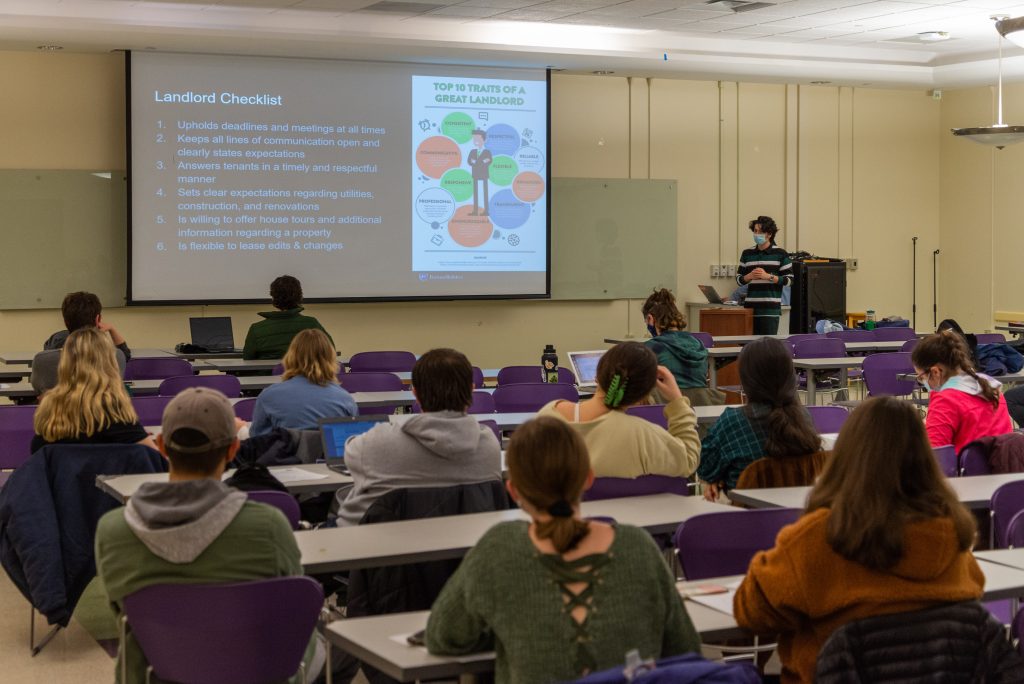Twenty students gathered in the University Union for the Off Campus College (OCC) Legal Clinic to discuss and learn about issues that plague both Binghamton University students and community members when searching for and living in off-campus housing.
The Student Association (SA) hosted the event in collaboration with the BU chapter of the New York Public Interest Research Group (NYPIRG), the Stakeholders of Broome County and the OCC Legal Clinic. The SA has hosted similar housing events in the past, but this was the first housing forum in years to bring together organizations from campus and the wider Binghamton community.
One of the event’s organizers, David Hatami, SA president and a senior double-majoring in business administration and political science, hoped the event would help students looking to move to Downtown Binghamton navigate the housing process.
“Speaking from firsthand experience, there isn’t much formal guidance offered to students when navigating through this process,” Hatami wrote in an email. “It can be very confusing and intimidating for individuals who have never done it before. We wanted to reach those students and provide some formal tips and resources they could use to better their search.”
Hatami opened the event with an overview of the off-campus housing process. This included a suggested timeline for signing leases, tips for the housing search, red flags when interacting with landlords and resources listing New York state tenant rights.
Further, both Hatami and Samantha Carroll, SA vice president for student success and a junior majoring in philosophy, politics and law, expressed that reports of tenant abuse by landlords in Downtown Binghamton inspired them to host the event. At the beginning of the semester, Carroll teamed up with the Stakeholders of Broome County, a local volunteer-based organization addressing housing inequities in the city of Binghamton, to create a survey collecting community concerns about housing.
As part of the town hall, Nate Hotchkiss, a volunteer with the Stakeholders of Broome County, discussed the results of the survey.
“There’s some really concerning [findings],” Hotchkiss said. “Twenty-five percent of people feel unsafe in their housing. Even though that’s not the majority, that’s still extremely concerning.”
Hotchkiss said the survey also revealed rising rent prices and poor housing conditions, such as mold, fire hazards, water damage and pests. He attributed these conditions to a lack of regulation in the student housing market.
Several of the event’s attendees reported that their own negative experiences with housing inspired their participation in the event. For example, Kira Hawes, a senior majoring in environmental policy, and Kristen Seward, ‘20, ‘21 MBA and an admissions counselor at BU, who are both looking to move downtown together next year, said they witnessed unprofessional behavior by landlords when touring apartments.
“We toured a place recently and liked the space,” Seward said. “The lease was really long, so I texted the landlord to give me 24 hours to actually read the lease. I asked them to please let me know if anyone else was interested in the property because we were probably going to sign. But then, at 3 o’clock in the morning, the lease was voided with no warning because someone else had signed.”
The pair went to look at another apartment the next day and had another negative experience.
“We went to do the tour and the landlord never showed up,” Hawes said. “There were too many red flags, and when I looked into the company on the lease, they owned many other properties in Binghamton, so it wasn’t a local landlord like we thought.”
For people like Hawes and Seward who have had poor experiences with housing in Binghamton, the town hall included resources and workshops on how to protect oneself from predatory landlords.
Diana Fabrizio, president of NYPIRG and a master’s student studying public administration, discussed the organization’s Small Claims Court Action Center as a resource to students looking to collect money they believe landlords owe them, such as security deposits. The Center, run by trained student volunteers with assistance from lawyers, helps students explore their options for securing this money and aids individuals in small claims court cases when necessary.
Additionally, Nick Scarantino, an attorney at Levene Gouldin & Thompson, LLP and the OCC Legal Clinic — a legal clinic provided free of charge by BU to students seeking general advice on matters such as tenant law, traffic tickets and petty crime — gave a workshop on reading leases and negotiating with landlords. Scarantino reviewed a sample lease and a real lease from an unnamed Binghamton landlord, pointing out provisions to look for and clauses that are either illegal or advantage landlords at the expense of tenants.
Further, Carroll said she hoped the town hall would educate students about their impact on the greater Binghamton community.
“I was learning through Stakeholders [of Broome County] events that gentrification is a huge problem,” Carroll said. “A lot of students unknowingly contribute to that.”
Hotchkiss also described gentrification in his presentation.
“The housing situation throughout Binghamton and Broome County is pretty abysmal in terms of accessibility, quality, affordability and safety,” Hotchkiss said. “All of those issues are compounded by the glut of student housing that increases prices and leads to the conversions of single-family homes [into student housing], displacing people who then have to seek lower-quality housing.”



